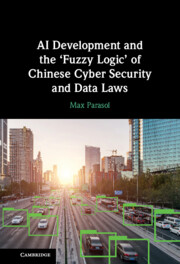Book contents
- AI Development and the ‘Fuzzy Logic’ of Chinese Cyber Security and Data Laws
- AI Development and the ‘Fuzzy Logic’ of Chinese Cyber Security and Data Laws
- Copyright page
- Contents
- Detailed Contents
- Acknowledgements
- Abbreviations
- Introduction
- Part I Historical and Doctrinal Background
- Part II Impact on Artificial Intelligence
- 6 The Impacts of Data Localisation on Globalised Ecosystems and Chinese Tech
- 7 Data Protection but Not Data Privacy
- 8 The Current State of AI Research Is Perfectly Suited to China’s Fuzzy Logic System
- 9 Open-Source AI Platforms and the Cyber Security Law
- Conclusion
- Bibliography
- Index
7 - Data Protection but Not Data Privacy
‘Data Protection Shall Not Hinder AI’
from Part II - Impact on Artificial Intelligence
Published online by Cambridge University Press: 16 December 2021
- AI Development and the ‘Fuzzy Logic’ of Chinese Cyber Security and Data Laws
- AI Development and the ‘Fuzzy Logic’ of Chinese Cyber Security and Data Laws
- Copyright page
- Contents
- Detailed Contents
- Acknowledgements
- Abbreviations
- Introduction
- Part I Historical and Doctrinal Background
- Part II Impact on Artificial Intelligence
- 6 The Impacts of Data Localisation on Globalised Ecosystems and Chinese Tech
- 7 Data Protection but Not Data Privacy
- 8 The Current State of AI Research Is Perfectly Suited to China’s Fuzzy Logic System
- 9 Open-Source AI Platforms and the Cyber Security Law
- Conclusion
- Bibliography
- Index
Summary
This chapter demonstrates the extent of the data protection problems in China, and the public’s growing concern about loss of privacy and abuse of their personal data. It proceeds to show that under China’s Cyber Security Law, the government has responded to this issue by strengthening ‘data protection’ from abuse by private companies but without shielding ‘data privacy’ from government intervention. In particular, enforced real-name user registration for online services potentially allows the Chinese government to demand access to the local data of any person who uses an online service in China, for national security or criminal investigation purposes. The chapter argues that this internal contradiction within the Cyber Security Law – increased data protection while demanding real-name user registration – may also benefit AI development. This is due, in part, to the vagueness of key terms within the Cyber Security Law, and the accompanying fuzzy logic within the Privacy Standards issued under that law, which allow both tech firms and government regulators considerable discretion in how they comply with and enforce data protection provisions. In the final part of the chapter, it is argued that due to the potential benefits of AI in solving serious governance problems, the Chinese government will only selectively enforce the data privacy provisions in the Cyber Security Law, seeking to prevent commercial abuse without hindering useful technological advances.
Keywords
Information
- Type
- Chapter
- Information
- Publisher: Cambridge University PressPrint publication year: 2021
